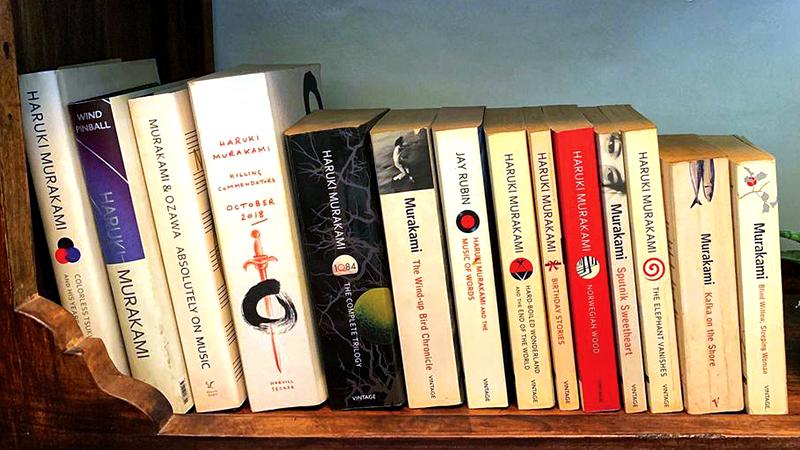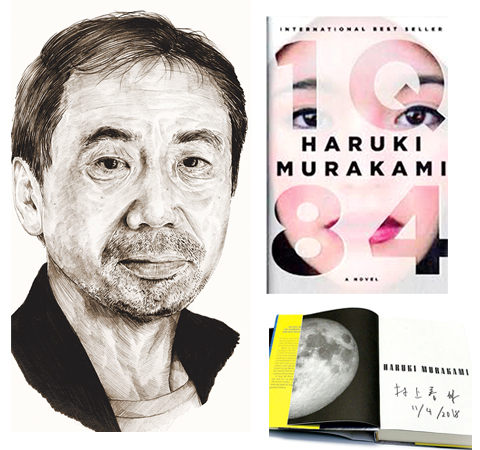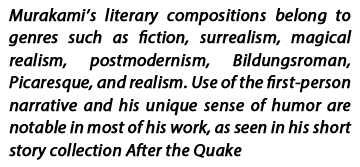
 Haruki Murakami, the eminent Japanese writer celebrated his 72nd birthday on January 12, 2021 . Born in 1949, Haruki Murakami earned numerous accolades throughout his 40 years of writing. The excellence in his literary works has been glorified, honoured, well recognised, and embraced by literary enthusiasts all over the world. His works have been bestsellers worldwide as they were translated into more than 50 languages.
Haruki Murakami, the eminent Japanese writer celebrated his 72nd birthday on January 12, 2021 . Born in 1949, Haruki Murakami earned numerous accolades throughout his 40 years of writing. The excellence in his literary works has been glorified, honoured, well recognised, and embraced by literary enthusiasts all over the world. His works have been bestsellers worldwide as they were translated into more than 50 languages.
Murakami’s exceptional literary compositions received accolades such as the Gunzo Award for Hear the Wind Sing, the Noma Literary Prize for A Wild Sheep Chase, the Tanizaki Prize for A Hard-Boiled Wonderland and The End of the World, the Yomiuri Prize for The Wind-Up Bird Chronicle, the Kuwabara Takeo Prize for Underground, the World Fantasy Award for Kafka on the Shore and the Frank O’Connor International Short Story Award for Blind Willow, Sleeping Woman. Murakami has also won the Hans Christian Andersen Literature Award and the Jerusalem Prize.
Personal Life
Murakami was the only child in his family who was born during the post-World War 11 era. Even though Murakami’s parents were Japanese literature teachers, his childhood was heavily influenced by Western culture, particularly Western as well as Russian music and literature.
His literary education was mainly influenced by European and American writers such as Franz Kafka, Gustave Flaubert, Charles Dickens, Kurt Vonnegut, Fyodor Dostoyevsky, Richard Brautigan, and Jack Kerouac.
 Murakami met his wife at the Waseda University in Tokyo where he was pursuing higher education in Drama. His first job was at a recording store and soon after he finished his studies, he opened a Coffee House and a Jazz Bar which he ran with his wife.
Murakami met his wife at the Waseda University in Tokyo where he was pursuing higher education in Drama. His first job was at a recording store and soon after he finished his studies, he opened a Coffee House and a Jazz Bar which he ran with his wife.
With the success he achieved with the book Hear the Wind Sing, he continued writing. Pinball and A Wild Sheep Chase were his consecutive works of literature which were critically acclaimed..
They were translated into English by Alfred Birnbaum who urged the Western world to explore Murakami’s works of literature. However, Murakami considers his first two novels to be ‘immature’ and ‘flimsy’.
“When I was in my teens, in the 1960s, that was the age of idealism. We believed the world would get better if we tried. People today don’t believe that, and I think that’s very sad.
People say my books are weird, but beyond the weirdness, there should be a better world. It’s just that we have to experience the weirdness before we get to the better world.
That’s the fundamental structure of my stories: you have to go through the darkness, through the underground, before you get to the light.”says Murakami referring to the fluctuations of critical knowledge in contemporary society.
Murakami’s writing style
Murakami’s literary compositions belong to genres such as fiction, surrealism, magical realism, postmodernism, Bildungsroman, Picaresque, and realism.
Use of the first-person narrative and his unique sense of humor are notable in most of his work, as seen in his short story collection After the Quake.
Murakami’s literary compositions are frequently surrealistic, melancholic, and fatalistic.
His narratives have absorbed the recurrent themes of alienation and loneliness.
Some analysts describe the aspects of shamanism in Murakami’s work. The book, Wind-Up Bird Chronicle fuses elements of physical violence related to war crimes. The novels, After the Quake and Underground possess a sense of trauma and chaos.
The themes and titles of his novels reflect his immense interest in Western music and literature.
The novel Norwegian Wood is named after the Beatles’ song and West of the Sun is named after the song South of the Border. They are a few of the examples which prove his deep connection with Western art and literature.
“Being born just after the war, we grew up in American culture: I was listening to jazz and American pop, watching American TV shows – it was a window to another world. But anyway, I got my own style.
Not Japanese or American style – my style. And I was a black sheep in the Japanese literary world”, Murakami says referring to the absence of any sense of being rooted in Japan in his compositions, and their multitudes of American cultural references.
Murakami’s deep interest in European fiction influenced him to translate the works of F. Scott Fitzgerald, Raymond Carver, Truman Capote, John Irving, and Paul Theroux into Japanese.
